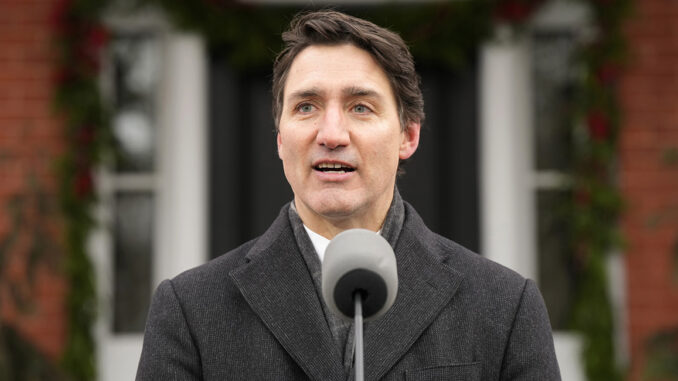

TORONTO — Canadian Prime Minister Justin Trudeau announced his resignation Monday in the face of rising discontent over his leadership and after the abrupt departure of his finance minister signaled growing turmoil within his government.
Trudeau said it had become clear to him that he cannot “be the leader during the next elections due to internal battles.” He planned to stay on as prime minister until a new leader of the Liberal Party is chosen.
“This country deserves a real choice in the next election, and it’s become clear to me that if I’m having to fight internal battles, I cannot be the best option in that election,” he said.
He said Parliament, which had been due to resume Jan. 27, would be suspended until March 24. The timing will allow for a Liberal Party leadership race.
All three main opposition parties have said they plan to topple the Liberal Party in a no-confidence vote when Parliament resumes, so a spring election after the Liberals pick a new leader was almost assured.
“The Liberal Party of Canada is an important institution in the history of our great country and democracy. A new prime minister and leader of the Liberal Party will carry its values and ideals into that next election,” Trudeau said. “I am excited to see that process unfold in the months ahead.”
Trudeau came to power in 2015 after 10 years of Conservative Party rule and had initially been hailed for returning the country to its liberal past. But the 53-year-old scion of one of Canadas most famous prime ministers became deeply unpopular with voters in recent years over a range of issues, including the soaring cost of food and housing, and surging immigration.
The political upheaval comes at a difficult moment for Canada internationally. U.S. President-elect Donald Trump has threatened to impose 25% tariffs on all Canadian goods if the government does not stem what Trump calls a flow of migrants and drugs in the U.S. — even though far fewer of each crosses into the U.S. from Canada than from Mexico, which Trump has also threatened.
Canada is a major exporter of oil and natural gas to the U.S., which also relies on its northern neighbor for steel, aluminum and autos.
Trudeau kept publicly mum in recent weeks despite intensifying pressure for him to step down.
“His long silence following this political drama speaks volumes about the weakness of his current position,” said Daniel Béland, a political science professor at McGill University in Montreal.
Canada’s former finance minister, Chrystia Freeland, announced her resignation from Trudeau’s Cabinet on Dec. 16., criticizing some of Trudeau’s economic priorities in the face of Trump’s threats. The move, which came shortly after the housing minister quit, stunned the country and raised questions about how much longer the increasingly unpopular Trudeau could stay in his job.
Trudeau had been planning to run for a fourth term in next year’s election, even in the face of rising discontent among Liberal Party members. The party recently suffered upsets in special elections in two districts in Toronto and Montreal that it has held for years. No Canadian prime minister in more than a century has won four straight terms.
Trudeau’s father swept to power in 1968, and led Canada for almost 16 years, becoming a storied name in the country’s history, most notably by opening its doors wide to immigrants. Pierre Trudeau was often compared to John F. Kennedy and remains one of the few Canadian politicians who are recognized in America.



